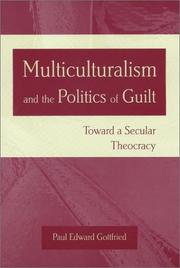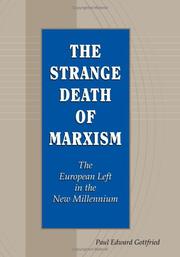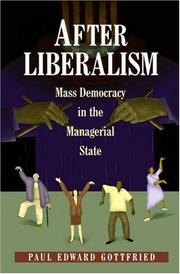| Listing 1 - 9 of 9 |
Sort by
|
Book
ISBN: 9781107675711 9781139224864 1139224867 9781107017245 1107017246 1107675715 9781139218344 1107230632 9781107230637 1139210149 9781139210140 1280485418 9781280485411 9786613580399 6613580392 1139223143 9781139223140 1139218344 9781139218344 1139215256 9781139215251 1139221434 9781139221436 1139083597 9781139083591 Year: 2012 Publisher: New York : Cambridge University Press,
Abstract | Keywords | Export | Availability | Bookmark
 Loading...
Loading...Choose an application
- Reference Manager
- EndNote
- RefWorks (Direct export to RefWorks)
This book offers an original interpretation of the achievement of Leo Strauss, stressing how his ideas and followers reshaped the American conservative movement. The conservative movement that reached out to Strauss and his legacy was extremely fluid and lacked a self-confident leadership. Conservative activists and journalists felt a desperate need for academic acceptability, which they thought Strauss and his disciples would furnish. They also became deeply concerned with the problem of 'value relativism', which self-described conservatives thought Strauss had effectively addressed. But until recently, neither Strauss nor his disciples have considered themselves to be 'conservatives'. Contrary to another misconception, Straussians have never wished to convert Americans to ancient political ideals and practices, except in a very selective rhetorical fashion. Strauss and his disciples have been avid champions of American modernity, and 'timeless' values as interpreted by Strauss and his followers often look starkly contemporary.
Conservatism --- History --- Strauss, Leo --- Criticism and interpretation. --- Influence. --- Arts and Humanities

ISBN: 0826263151 9780826263155 9780826214171 0826214177 0826215203 9780826215208 Year: 2002 Publisher: Columbia, Mo. : University of Missouri Press,
Abstract | Keywords | Export | Availability | Bookmark
 Loading...
Loading...Choose an application
- Reference Manager
- EndNote
- RefWorks (Direct export to RefWorks)
Political culture --- Multiculturalism --- Behavior modification --- Political correctness --- Cultural pluralism

ISBN: 082626493X 0826215971 9780826215970 9780826264930 Year: 2005 Publisher: Columbia : University of Missouri Press,
Abstract | Keywords | Export | Availability | Bookmark
 Loading...
Loading...Choose an application
- Reference Manager
- EndNote
- RefWorks (Direct export to RefWorks)
"Describes a twentieth-century transformation in European leftist and Marxist politics. European Marxism began as an economically focused workers' movement, then became the domain of those desiring cultural transformation of Western Europe. The transformation emphasizes Western European guilt and promotes multiculturalism, feminism, and acceptance of alternative lifestyles condemned by European cultures"--Provided by publisher.
Book
ISBN: 1501757490 1609092171 0875807623 9781609092177 9780875807621 Year: 2017 Publisher: DeKalb, IL
Abstract | Keywords | Export | Availability | Bookmark
 Loading...
Loading...Choose an application
- Reference Manager
- EndNote
- RefWorks (Direct export to RefWorks)
Paul Gottfried's critical engagement with political correctness is well known. The essays in Revisions and Dissents focus on a range of topics in European intellectual and political history, social theory, and the history of modern political movements. With subjects as varied as Robert Nisbet, Whig history, the European Union election of 2014, and Donald Trump, the essays are tied together by their strenuous confrontation with historians and journalists whose claims about the past no longer receive critical scrutiny. According to Gottfried, successful writers on historical topics take advantage of political orthodoxy and/or widespread ignorance to present questionable platitudes as self-evident historical judgments. New research ceases to be of importance in determining accepted interpretations. What remains decisive, Gottfried maintains, is whether the favored view fits the political and emotional needs of what he calls "verbalizing elites." In this highly politicized age, Gottfried argues, it is necessary to re-examine these prevalent interpretations of the past. He does so in this engaging volume, which will appeal to general readers interested in political and intellectual history.
Conservatism. --- Liberalism. --- Right and left (Political science) --- Political science --- Philosophy. --- Political philosophy --- Left (Political science) --- Left and right (Political science) --- Right (Political science) --- Liberal egalitarianism --- Liberty --- Social sciences --- Conservativism --- Neo-conservatism --- New Right --- Sociology
Book
ISBN: 1501760572 1501749870 Year: 2021 Publisher: Ithaca : Northern Illinois University Press,
Abstract | Keywords | Export | Availability | Bookmark
 Loading...
Loading...Choose an application
- Reference Manager
- EndNote
- RefWorks (Direct export to RefWorks)
This anthology provides a timely critical overview of the American conservative movement. The contributors take on subjects that other commentators have either not noticed or have been fearful to discuss. In particular, this collection of searing essays hits hard at blatant cult of celebrity and intolerance of dissent that has come to characterize the conservative movement in this country.
Book
ISBN: 1501759361 9781501759369 9781501759376 150175937X 9781501759352 Year: 2021 Publisher: Ithaca [New York]
Abstract | Keywords | Export | Availability | Bookmark
 Loading...
Loading...Choose an application
- Reference Manager
- EndNote
- RefWorks (Direct export to RefWorks)
"This book deals with the continuing appeal of antifascism as a political concept and as a tool for fighting a real or imagined fascist enemy. Antifascism has undergone significant changes in how it has understood and combatted a perceived fascist danger from the 1920s down to the present"--
Fascism --- Anti-fascist movements --- Right and left (Political science) --- History.
Book
ISBN: 9781501749872 9781501749865 1501749862 1501749870 9781501749858 1501749854 9781501760570 1501760572 Year: 2020 Publisher: Ithaca
Abstract | Keywords | Export | Availability | Bookmark
 Loading...
Loading...Choose an application
- Reference Manager
- EndNote
- RefWorks (Direct export to RefWorks)
This anthology provides a timely critical overview of the American conservative movement. The contributors take on subjects that other commentators have either not noticed or have been fearful to discuss. In particular, this collection of searing essays hits hard at blatant cult of celebrity and intolerance of dissent that has come to characterize the conservative movement in this country.

ISBN: 0691059837 0691089825 9786612935220 1400822890 1282935224 1400811813 9781400822898 9781400811816 9780691089829 9780691059839 9781282935228 6612935227 9780691089829 1400802954 1400802938 Year: 1999 Publisher: Princeton, N. J. Princeton University Press
Abstract | Keywords | Export | Availability | Bookmark
 Loading...
Loading...Choose an application
- Reference Manager
- EndNote
- RefWorks (Direct export to RefWorks)
In this trenchant challenge to social engineering, Paul Gottfried analyzes a patricide: the slaying of nineteenth-century liberalism by the managerial state. Many people, of course, realize that liberalism no longer connotes distributed powers and bourgeois moral standards, the need to protect civil society from an encroaching state, or the virtues of vigorous self-government. Many also know that today's "liberals" have far different goals from those of their predecessors, aiming as they do largely to combat prejudice, to provide social services and welfare benefits, and to defend expressive and "lifestyle" freedoms. Paul Gottfried does more than analyze these historical facts, however. He builds on them to show why it matters that the managerial state has replaced traditional liberalism: the new regimes of social engineers, he maintains, are elitists, and their rule is consensual only in the sense that it is unopposed by any widespread organized opposition. Throughout the western world, increasingly uprooted populations unthinkingly accept centralized controls in exchange for a variety of entitlements. In their frightening passivity, Gottfried locates the quandary for traditionalist and populist adversaries of the welfare state. How can opponents of administrative elites show the public that those who provide, however ineptly, for their material needs are the enemies of democratic self-rule and of independent decision making in family life? If we do not wake up, Gottfried warns, the political debate may soon be over, despite sporadic and ideologically confused populist rumblings in both Europe and the United States.
Cultural pluralism. --- Democracy. --- Liberalism. --- Populism. --- Public administration. --- Social engineering. --- Welfare state. --- Ingénierie sociale --- Pluralisme (Sciences sociales) --- Pluralisme (Sociale wetenschappen) --- Populisme --- Social engineering --- Sociale engineering --- Engineering, Social --- Political science --- Cultural diversity --- Diversity, Cultural --- Diversity, Religious --- Ethnic diversity --- Pluralism (Social sciences) --- Pluralism, Cultural --- Religious diversity --- Culture --- Cultural fusion --- Ethnicity --- Multiculturalism --- Self-government --- Equality --- Representative government and representation --- Republics --- Liberal egalitarianism --- Liberty --- Social sciences --- Social control --- Administration, Public --- Delivery of government services --- Government services, Delivery of --- Public management --- Public sector management --- Administrative law --- Decentralization in government --- Local government --- Public officers --- State, Welfare --- Economic policy --- Public welfare --- Social policy --- State, The --- Welfare economics --- Political philosophy. Social philosophy --- Welfare state --- Public administration --- Liberalism --- Democracy
Book
ISBN: 1501756982 1609091833 9781609091835 9780875804934 0875804934 0875807828 Year: 2016 Publisher: DeKalb : Northern Illinois University Press,
Abstract | Keywords | Export | Availability | Bookmark
 Loading...
Loading...Choose an application
- Reference Manager
- EndNote
- RefWorks (Direct export to RefWorks)
What does it mean to label someone a fascist? Today, it is equated with denouncing him or her as a Nazi. But as intellectual historian Paul E. Gottfried writes in this provocative yet even-handed study, the term's meaning has evolved over the years. Gottfried examines the semantic twists and turns the term has endured since the 1930s and traces the word's polemical function within the context of present ideological struggles.Like "conservatism," "liberalism," and other words whose meanings have changed with time, "fascism" has been used arbitrarily over the years and now stands for a host of iniquities that progressives, multiculturalists, and libertarians oppose, even if they offer no single, coherent account of the historic evil they condemn. Certain factors have contributed to the term's imprecise usage, Gottfried writes, including the equation of all fascisms with Nazism and Hitler, as well as the rise of a post-Marxist left that expresses predominantly cultural opposition to bourgeois society and its Christian and/or national components. Those who stand in the way of social change are dismissed as "fascist," he contends, an epithet that is no longer associated with state corporatism and other features of fascism that were once essential but are now widely ignored. Gottfried outlines the specific historical meaning of the term and argues that it should not be used indiscriminately to describe those who hold unpopular opinions. His important study will appeal to political scientists, intellectual historians, and general readers interested in politics and history.
Fascism. --- Neo-fascism --- Authoritarianism --- Collectivism --- Corporate state --- National socialism --- Synarchism --- Totalitarianism --- intellectual history, post-Marxist.
| Listing 1 - 9 of 9 |
Sort by
|

 Search
Search Feedback
Feedback About UniCat
About UniCat  Help
Help News
News